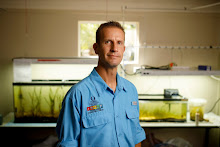
She has a pretty good record of enforcing pollution-prevention regulations and setting CO2 emissions reduction goals, although she has been criticized by some for caving in to pressure from industry lobbyists. Industry lobbyists combine the worst traits of lawyers, marketers, and corporate officers, making them some of the most evil people on earth, in my humble opinion. You better believe they're scrambling to sink their poisonous fangs into Mrs. Jackson right now.

You can help counteract the effects of lobbyist-venom by writing to Lisa and letting her know that you support serious efforts to protect the nation's natural ecosystems. The address is:
Lisa Jackson, Administrator Designate
Environmental Protection Agency
Ariel Rios Building
1200 Pennsylvania Avenue, NW
Washington, D.C. 20460.
Bill Baker, the head of the Chesapeake Bay Foundation, suggested in an email that CBF members write and emphasize the particular importance of restoring "the world's greatest estuary" (the Chesapeake), so that's what I'm doing. If there's another natural area or environmental issue that's near and dear to your heart (for example, Washington State's Puget Sound or Florida's Everglades or Indian River Lagoon) you could write about that.
Here's my letter:
Dear Administrator Jackson,
Congratulations on your recent appointment to EPA head! I hope that you will waste no time in strengthening the environmental protections that were weakened by your pro-industry predecessors from the Bush era. In particular, I hope that you will turn your attention to restoring the majesty and integrity of the nation's great estuaries, including the imperiled Chesapeake Bay.
As a marine biologist trained at the Virginia Institute of Marine Science, I became well-versed in the tragic tale of the Chesapeake's degradation: 1) The loss of wetlands and forests in the watershed and the unmanaged effluent of a growing population turned the water from clear to brown and increased the frequency and severity of toxic algal blooms and anoxic events. 2) The overharvest of fish and shellfish lead to their near extinction and to the collapse of many fisheries. 3) The demise of oyster reefs and seagrass beds compounded the problems of pollution and fisheries losses by removing the Bay's natural filtration capacity and nursery habitats.
I remain optimistic, however, because I know all the Bay's problems have solutions, pending the political will to implement them. Curbing urban sprawl, funding modern wastewater treatment facilities, prohibiting the sale of synthetic lawn and garden fertilizers, encouraging organic farming and native plant landscaping, and strictly enforcing riparian buffer zones will all help to improve water quality.
Restoration of fish and shellfish stocks is also achievable. The example of the striped bass showed that a temporary moratorium on harvest, followed by strict, science-based management, can quickly restore the population and economic role of a once-threatened species. Similarly aggressive management is long overdue for blue crabs and oysters. With the oysters, in particular, a shift needs to be made away from "put and take" stocking / harvest programs, which amount to inefficient welfare for oyster harvesters and do nothing to permanently rebuild the oyster population or create a sustainable fishery. Wild-harvest of oysters is simply not sustainable on a large scale. To survive, the Chesapeake oyster industry must do as every other oyster industry in the world has already done, and shift to 100% aquaculture. Oyster restoration for ecological purposes (rebuilding natural oyster reefs for their habitat and water-filtration role) will then be able to proceed successfully, unbound from the harvest industry.
Seagrass beds will be a vital indicator of the progress of Chesapeake Bay restoration, because of their dependency on good water quality and a fully functioning ecosystem. The seagrass species "eelgrass" is also a canary-in-the-mineshaft for global warming, because it is near the Southern end of its range limit in Chesapeake Bay and is decimated by hotter-than normal summers.
In summary, because of Chesapeake Bay's historical importance, its proximity to the cultural, population, and political centers of the US, and its serious-but-solvable ecological problems, it should be a cornerstone of the EPA's activities under your administration.
Thanks,
James Douglass, Ph.D.

2 comments:
and you think this makes up the taking of that poor turtles life!
you should only sail in swimming pools from now on.
This is just step 1 in my 12 step turtle atonement program. :P
Post a Comment